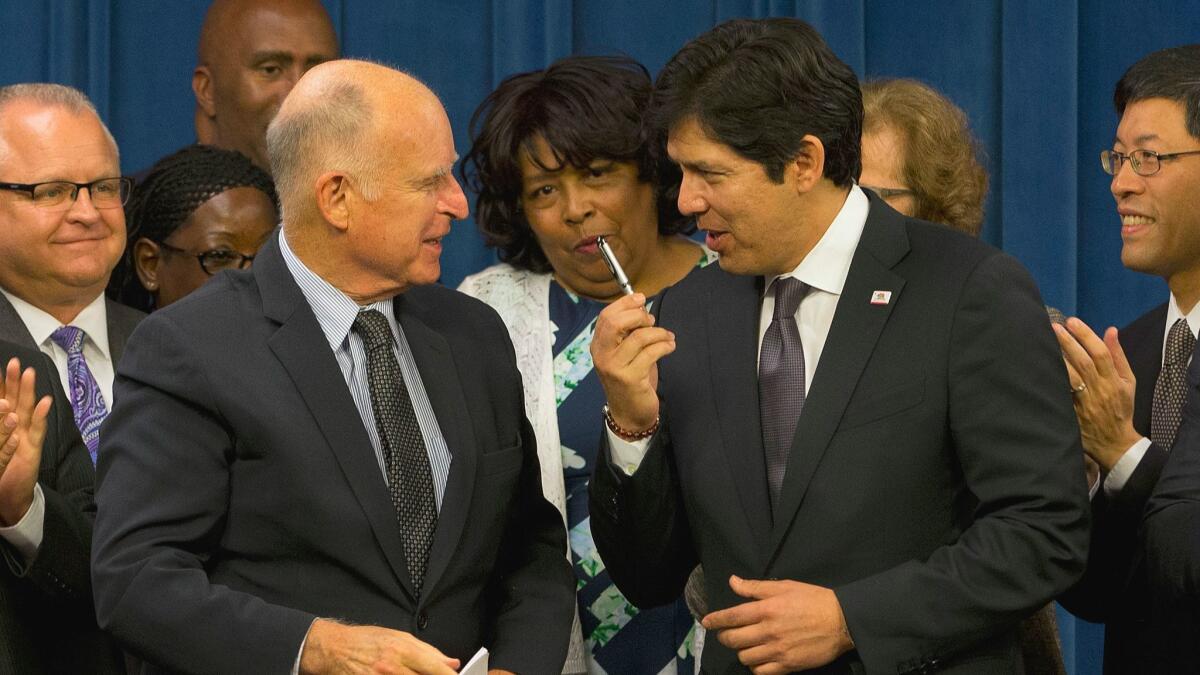Opinion: Will the Senate side with seniors or with Wall Street?

- Share via
The push by Wall Street mutual funds to kill state-run retirement savings programs for lower-income workers sputtered in the U.S. Senate, as some Republican lawmakers balked at undermining efforts by California and other states to help workers not covered by a pension or 401(k) plan. But the funds’ allies may finally have lined up 50 GOP votes for Wall Street’s position, meaning the measure could come to the floor as soon as Wednesday — and that Vice President Mike Pence may need to break the tie.
Talk about a thankless job.
Remember that whole populist, drain-the-swamp, power-to-the-people thing that swept Pence and his running mate, Donald J. Trump, into office last year? This piece of special-interest legislation is the antithesis of all that. And asking Pence to cast the tiebreaking vote in favor is akin to having him wade deeply into the swamp and declare that he really likes it there.
California created Secure Choice because 7.5 million workers ... don’t have employee retirement benefits. That’s a huge hole Wall Street isn’t filling.
The bill (HJR 66) would nullify a Department of Labor finding last year that certain state-run retirement savings plans did not have to comply with the federal law governing employer-provided retirement benefits (the Employee Retirement Income Security Act of 1974, better known by its acronym, ERISA). Culminating years of work by California Senate President Pro Tem Kevin de León (D-Los Angeles), among others, the ruling recognized that the elaborate regulations of ERISA weren’t appropriate for state-run savings plans that offered plenty of other protections for participating workers.
California’s new Secure Choice plan is a good illustration. Except for the smallest employers, any business in the state that does not offer retirement benefits will have to let their workers know about Secure Choice, a new savings program overseen by the state, and enroll them in it unless they opt out. These workers would have a small percentage of their pre-tax pay deposited into privately managed individual retirement accounts, which would follow them if they switched jobs and grow tax-free until they retired.
No employer group in California opposed the program. Mutual fund companies did, however, apparently afraid that it would dissuade employers from hiring them to offer 401(k) plans. They and their allies on Capitol Hill argue that the state savings programs are too dangerous for workers, given that they won’t be covered by ERISA, and too risky for taxpayers, on the assumption that state governments would somehow be liable if the IRAs didn’t perform well.
The arguments are misleading in all kinds of ways, most fundamentally because they advance the notion that state government is trying to crowd out noble, civic-minded Wall Street firms eager to help low-income workers save for retirement. California lawmakers created Secure Choice because an estimated 7.5 million workers in the state don’t have employee retirement benefits. That’s a huge hole Wall Street isn’t filling.
Study after study has shown how little Americans save for retirement. And while Social Security protects against destitution, it won’t necessarily lift people out of poverty after they quit work. That’s particularly true for workers in lower-paying jobs, who have so little disposable income that any kind of saving is a challenge. Enabling them to steer a few pre-tax dollars into an IRA every paycheck could make a huge difference over the years.
This isn’t about stopping government from competing with private industry. This is about letting government offer an alternative for people who simply aren’t being served by the private sector today. If Wall Street was catering to smaller employers and lower-wage businesses today, De León wouldn’t have gotten Secure Choice through the Legislature.
HJR 66 is legislation by and for the very sort of special interest Trump and Pence supposedly were going to stand up to. Granted, there’s at least one special interest on the other side — AARP, which sent a letter to U.S. senators urging them not to vote for the resolution. Senators should listen to the special interest that isn’t lobbying for its own financial well-being, but for that of the seniors the senators represent.
Twitter: @jcahealey
More to Read
A cure for the common opinion
Get thought-provoking perspectives with our weekly newsletter.
You may occasionally receive promotional content from the Los Angeles Times.










